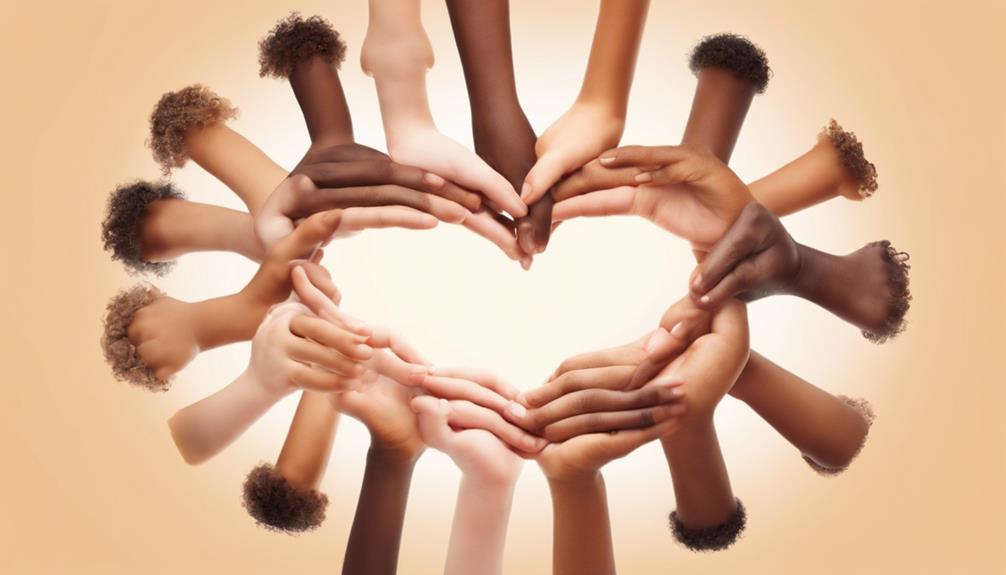Often debated, the question 'Is Bullying a Sin?' explores the intricate balance between ethics, psychology, and spirituality, inviting a deeper reflection.

Is Bullying a Sin?
Just as a single stone thrown into a pond creates ripples that spread far beyond the initial splash, so too does the act of bullying send waves through the lives of those it touches.
You might wonder where the line between moral misstep and sin lies when it comes to causing such ripples. Various religious texts offer insights, yet the psychological impacts and ethical considerations present a complex tapestry that's not easily unraveled.
As you consider the ways in which promoting compassion and empathy could counteract these ripples, you're left pondering the true nature of bullying's mark on both society and the soul.
Key Takeaways
- Bullying is considered a sin by major religions, advocating for kindness and empathy.
- Sin and morality are subjective, but cultural norms universally condemn bullying.
- Bullying violates ethical principles of non-maleficence and justice, aligning with the concept of sin.
- Promoting compassion and empathy effectively addresses the root causes of bullying, reflecting a moral and religious stance against it.
Defining Sin and Morality

Before we delve into the complex relationship between bullying and sin, it's crucial to understand what we mean by sin and morality, as these concepts form the foundation of our analysis. Sin, in a broad sense, is considered an act that violates a moral rule, while morality is a system of beliefs about what's right and wrong that guides behavior. These definitions, however, are deeply influenced by cultural norms and legal perspectives, making the concept of sin highly subjective.
From a legal standpoint, actions that constitute bullying mightn't always align with what's considered sinful in various cultural contexts. For instance, while most societies condemn physical harm or theft as both illegal and immoral, psychological forms of bullying such as exclusion or spreading rumors mightn't always be legally actionable, even though they're often seen as morally reprehensible. This discrepancy highlights the complexity of aligning moral and legal judgments.
Moreover, cultural norms play a significant role in shaping the perception of sin and morality. What's considered a sinful act of bullying in one culture might be seen as a rite of passage or tough love in another. This variation underscores the importance of considering multiple perspectives when analyzing the morality of bullying.
Bullying in Religious Texts
Analyzing religious texts reveals varied perspectives on bullying, highlighting its moral implications across different faiths. Scriptural interpretations often reflect the ethos of compassion, empathy, and respect, underscoring the moral and ethical stance against bullying. Here's how various religious traditions approach the issue:
- Christianity: Biblical passages, such as the teachings of Jesus in the Sermon on the Mount, advocate for love, kindness, and forgiveness. Religious leadership often interprets these teachings as a clear denouncement of bullying behaviors.
- Islam: The Quran and Hadiths emphasize dignity, respect, and the importance of treating others with compassion. Scholars argue that these principles inherently condemn any form of bullying or harm towards others.
- Buddhism: With its core principles of compassion and non-harm (ahimsa), Buddhist teachings strongly oppose bullying. The emphasis is on understanding the suffering of others and acting with kindness.
- Hinduism: Hindu scriptures, such as the Bhagavad Gita, promote the values of self-control, non-violence, and respect for all beings. This ethos is interpreted as a foundational argument against the act of bullying.
These religious perspectives, through their scriptural interpretations and guidance from religious leadership, offer a moral framework that universally condemns bullying, advocating for a global ethos of empathy, respect, and kindness.
Psychological Impact of Bullying

The psychological impact of bullying extends deep into the psyche, influencing victims' emotional well-being and mental health in profound ways. It's vital to understand that the ramifications aren't superficial; they're entrenched in the very fabric of a person's emotional and mental landscape.
Bullying triggers a spectrum of adverse psychological outcomes, ranging from immediate stress responses to long-term psychiatric conditions like anxiety, depression, and post-traumatic stress disorder (PTSD).
Analyzing victim resilience offers insights into recovery and coping mechanisms. Resilience isn't a one-size-fits-all response but a complex interplay of personal strengths and external support systems. It's shaped by individual personality traits, family dynamics, and the availability of supportive resources. Victims who develop resilience often learn to navigate adverse situations more effectively, yet the path to resilience can be arduous and non-linear.
Furthermore, the role of social dynamics in bullying can't be understated. Bullying often alters victims' perceptions of social interactions, leading to difficulties in forming and maintaining healthy relationships. This social alienation compounds the psychological distress, creating a vicious cycle of isolation and mental health challenges. Understanding these dynamics is crucial for addressing the full scope of bullying's psychological impact.
Ethical Considerations
Understanding the profound psychological effects of bullying naturally leads us to examine its ethical implications. When you delve into the ethical considerations of bullying, you're essentially questioning the moral fabric that holds society together. The examination of bullying from an ethical standpoint reveals a complex interplay between individual actions and societal norms. To navigate this terrain, consider the following points:
- Respect for Autonomy: Bullying infringes on an individual's right to make choices about their own life and body. This violation directly contradicts societal norms that value personal freedom and autonomy.
- Non-Maleficence: The principle of not causing harm to others is a foundational ethical standard. Bullying, by its very nature, causes psychological and sometimes physical harm, thus breaching this ethical principle.
- Justice: Ethically, all individuals deserve to be treated with fairness and equity. Bullying creates an environment where certain individuals are marginalized and treated unjustly, challenging the ethical commitment to equality.
- Legal Implications: Beyond societal norms, there are legal frameworks in place designed to protect individuals from harassment and abuse. Bullying can have legal ramifications, reflecting society's recognition of its ethical unsuitability.
Promoting Compassion and Empathy

Promoting compassion and empathy serves as a fundamental strategy in addressing the root causes of bullying by fostering a culture of understanding and mutual respect. By elevating emotional intelligence within communities and institutions, you're essentially equipping individuals with the ability to recognize and understand their own emotions as well as those of others. This heightened awareness facilitates a decrease in aggressive behaviors, as it encourages a more empathetic perspective towards peers.
Implementing kindness programs in educational settings is a practical approach to cultivate these values from a young age. These initiatives not only teach children about the importance of being kind to one another but also provide them with concrete examples of how to express compassion in their daily interactions. The integration of such programs into the curriculum can significantly alter the social dynamics among students, making the environment less conducive to bullying.
In essence, fostering an atmosphere where empathy and compassion are valued and promoted is key to creating lasting change. It's not just about preventing negative behaviors but also about encouraging positive ones, thereby laying the groundwork for a more inclusive and respectful society.
Frequently Asked Questions
How Do Legal Systems Across Different Countries Address Bullying, and Does It Align With Religious or Moral Views on Sin?**
Legal systems worldwide vary in addressing bullying, often reflecting cultural enforcement and legal definitions. While some align with religious or moral views on sin, others prioritize secular legal frameworks to combat this issue.
Can Forgiveness and Reconciliation Between the Bully and the Victim Be Achieved Without Religious Intervention, and What Are the Psychological Implications?**
You can achieve forgiveness and reconciliation without religious intervention through healing processes that bolster emotional resilience. These steps may improve psychological well-being, fostering an environment where both the bully and victim can find mutual understanding and peace.
Are There Any Documented Cases Where Victims of Bullying Have Turned Their Experiences Into Positive Outcomes Without Relying on Religious or Ethical Frameworks?**
Yes, there are cases where victims have transformed their bullying experiences into career development opportunities and self-esteem boosts without religious or ethical frameworks, demonstrating resilience and the ability to find strength in adversity.
How Do Different Cultures Interpret the Concept of Bullying in Relation to Sin, and Are There Unique Forms of Addressing It Outside of Western Perspectives?**
Different cultures view bullying through various lenses, including cultural rituals and education systems. You'll find that addressing it often involves unique approaches, diverging significantly from Western norms, without directly labeling it as sin.
What Role Do Social Media and Technology Play in Modern Bullying, and How Do These Platforms Confront or Contribute to the Moral and Ethical Considerations of Bullying as a Sin?**
Social media and technology reshape bullying, demanding cyber etiquette and platform responsibility. They amplify actions, challenging ethical standards. Your understanding of these dynamics is critical in addressing how these platforms manage or exacerbate bullying behaviors.
Conclusion
In conclusion, when examining bullying through various lenses—be it religious texts, psychological impacts, or ethical considerations—it's evident that such behavior diverges significantly from moral and compassionate conduct. Most religious doctrines implicitly or explicitly condemn actions that harm others, aligning with the ethical stance that bullying is inherently wrong.
Understanding its profound psychological effects further underscores the importance of fostering empathy and kindness. Ultimately, adopting a compassionate approach not only aligns with moral principles but also promotes a healthier, more inclusive society.



Sign up